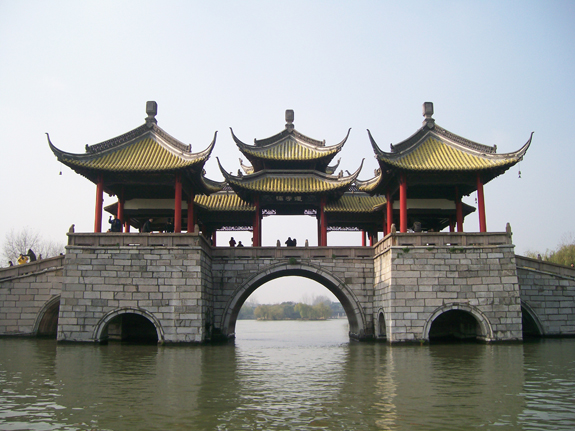
Last November I went to Shanghai to take part in a Chinese-English Poetry Fellowship at the University of Fudan, together with George Szirtes and his wife, the artist Clarissa Upchurch. We were to translate two Chinese poets, Yang Lian and Xiao Kaiyu. It was my third visit to China and my previous trips had already given me enticing glimpses into contemporary Chinese poetry and this ancient culture. After descending into the subterranean vault of the Shanghai Museum, with its balconies of trompe l’oeil mountains and painted sky-ceiling that can change from dawn to dusk at the flick of a switch, I realised just how ancient this puzzling culture is. Calligraphy unrolled on rivers of rice paper as we sat on benches around the viewing table. Then the curator of bronzes brought in a large Shang dynasty taotie cauldron and I struggled to comprehend the primeval era it came from.
As it was slowly unwrapped, we saw that there was a demon carved in low relief on the front and back of the vessel. He had tripod legs and verdigris cloud motifs around and inside his face. Lian joked that there would have been a girl’s skull inside the pot when it was excavated at Anyang. These cauldrons were thought to have been used for cannibalistic rites, but no one knew for sure if taotie was a god who demanded human sacrifice, since other finds in the old capital of Yin (now known as Anyang) reveal an advanced civilisation with the rudiments of early Chinese characters. This artefact was the subject of a poem of Lian’s I was about to translate, ‘Questions about the Demon Taotie’:
Questions about the Demon Taotie
The Pole Star is set in the centre of his forehead.
The deep blue is crystalline his ice pupil
has destroyed everything Does the lonely
boiled girl embrace everything?Escaping from Anyang is an escape into the Yin night
No other light except this sight
luxuriously grinding a huge axe
Where did the tender broken limbs fall?Looking up for thousands of years
we sink down Water always grinds its teeth
beneath us the girl collapsing to a gurgle
Does Taotie seize or chew?Thousands of words re-split open are still
the one character that one stroke captures life’s flow
has been cooked ten thousand times the flesh still soaked in sorrow
to reawaken Is seizing chewing?This face is even more ruthless
than non-being this powerlessness
staring out rams a hole
to pound away What beauty is not bloody?Our floating life is carved
on the shallow bronze relief Does
the pupil’s axle icily shrink space?
How many suns don’t rise or set in the darkness of naming?The girl swings gracefully back from the Yin
night Does a thin fragrance snuff out all light?
Do bestial and human faces gently clasp vapour?
Has unutterable language finally fulfilled the sacrifice?by Yang Lian (First published in Poetry Review, spring issue 2012)
I had translated Lian’s work before but knew nothing about Kaiyu’s poetry. The poems George and I worked on during this project revealed him to be a complex, challenging poet, wide-ranging in subject and form, and some of his lines can be bafflingly abstract to translate into English. I wish I could have had more time to work with him, but we had a lot of events and sightseeing crammed into our fortnight.
At Fudan University, George and I each gave a talk, took part in panel discussions and gave several poetry readings. Since both Lian and Kaiyu had translated the same poems of mine, they read both versions. We also took part in a day of events at Shanghai University. During the discussions and dialogues it was fascinating to listen to what Kaiyu and Lian had to say about their relationship to current Chinese poetry and their classical tradition.
Kaiyu arranged a visit to the painter Jiu Dahong, at the Shanghai Normal University, whose extraordinarily intricate figurative work reminded me of Hieronymous Bosch. He was tolerated enough to be allowed to paint in his cramped studio in the art department but not allowed to teach, in case his politics might influence the students. I had been warned that it was best not to mention Ai Weiwei on this trip, but Jiu’s situation reminded me of him and how claustrophobically restricted artists and poets are here. At least he was not under house arrest, as Ai had been, even though some of Jiu’s paintings are highly satirical and critical of the government.
To give us an insight into traditional China, one night, Kaiyu arranged a mystery tour to the watery village of Jinze, which is about eighty miles from Shanghai and built around meanders of a river and canal. I slept in a vast room with ensuite jacuzzi and power shower room and an en suite loo with heated toilet seat that raised its lid on approach. I woke at 5am and worked on my translations at the large trestle table before the windows, while waiting for dawn. When I opened the curtains I found I was next to a wide waterway swirling past my huge, wood-filigree windows. It had rained all night and the water seemed almost under the floor, and I wondered what happened during floods.
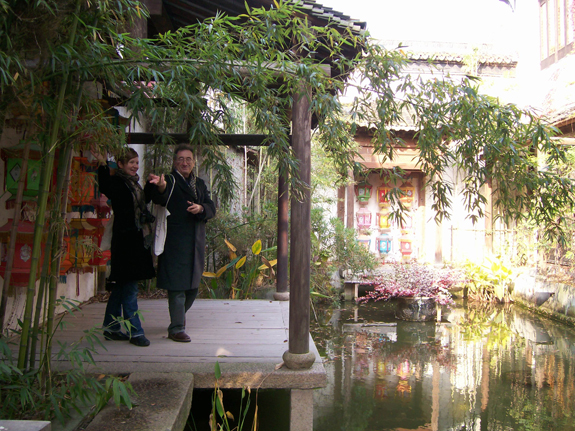
But it was a sunny day, so we walked along the canal and over the numerous ancient arched bridges. At times the waterways forked. The complex we slept in was itself built between water, with water channels outside each door. We visited a Taoist temple and a Buddhist temple built around a 650-year-old gingko tree strung with red lanterns. I think it was the first time I relaxed since I’d arrived in China, away from the cacophony of horns outside our Fudan University hotel.
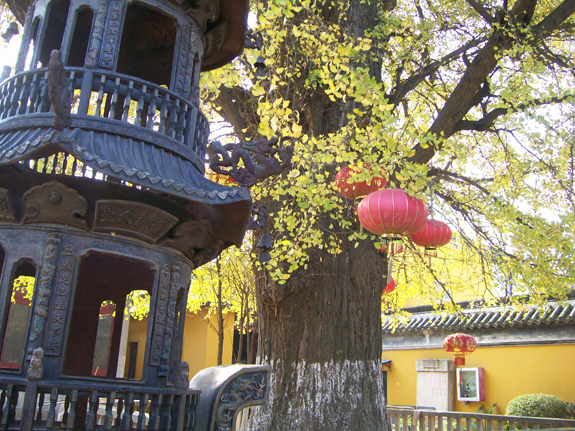
After clambering over many bridges, and Lian had lured George onto a dragon boat, we had lunch and were joined by Kaiyu, who whisked us away to what I thought was going to be a stroll in the vegetable gardens. And this is where the mystery tour became surreal – a Russian doll of surrealism was slowly opened behind the willow and bamboo paths. Hall after hall of exquisitely designed galleries were unlocked for us, their floorboards pastel shades of woods from the factories they had been reconstructed from. They contained antique furniture, books, dolls, gourds, sedan chairs, wardrobes, puppets, emperors’ beds, seals, and happiest of all – textiles. Heavily embossed silk robes for Buddhas, more 3D than embroidery. Locked in one endless hall were a mother and daughter of the Miao southwest China ethnic group, weaving their sumptuous cloth, silver in their hair. I’d come across them before on Qingcheng Mountain in Sichuan Province. We went up more stairs to an attic where designer cloaks were being woven from silk organza and a raffia-like wool. Clarissa tried one on and it suited her perfectly.
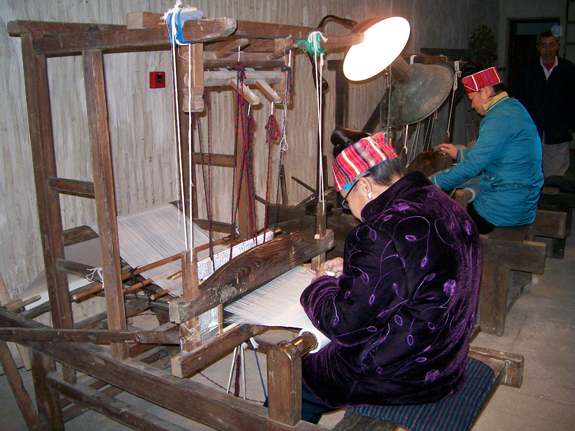
Kaiyu then led us out onto terraces with views of the waterways and their bridges. He pointed to a room where he comes to write and we were invited to return for a writing retreat, an invitation I almost took up, before I remembered how far it was from home, this land of water like woven silk, of silk like woven water, yellow gingko leaves strewn on the ground like confetti.
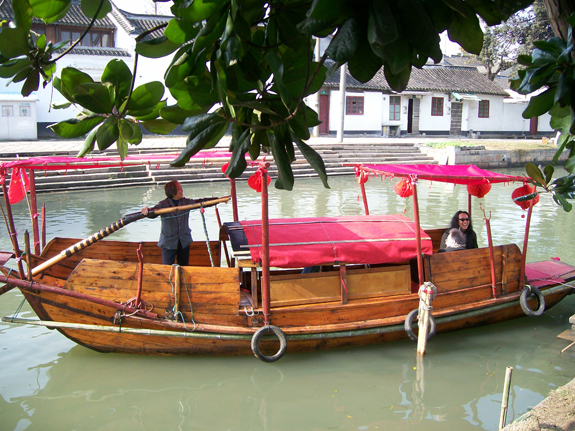
So, back to the endless fifty-floor towers of Shanghai. On the way, we visited one of the founders of the Jinze Craft Museum, the quiet ex-artist Mr Hu with his champagne coloured poodles and his talk of friendship with Prince Charles and the royalty who have visited for architectural design tips. Next, a dash for the rush-hour subway where we swayed with our luggage for hours before ascending at the Centre for the Oriental Arts, to another gift from Kaiyu – a concert by the fusion group Amrta, almost all women, and their spellbinding music. In my front row seat I waited to hear the erhu, a kind of two-stringed fiddle, as it features in a poem of Kaiyu’s I was translating, a powerful elegy to his mother’s ghost and the fatal constraints of a repressive society. I was not disappointed. The erhu sounded hoarse, primordial and sad, and I can still hear it like the sound of water that has dried up.
On our last weekend in Shanghai we were treated to another watery experience: we caught a 330 kilometres-an-hour train to the city of Yangzhou, north west of Shanghai and across the vast Yangtze River, to take part in a poetry festival. The train station was big as a Heathrow terminal. Yang Lian upgraded our first class tickets to super first with just one word whispered in the conductor’s ear, so we settled in the sleek, private, dragon-head of the train and got to work. George and I had one hour to write our translations of the Qing Dynasty ‘Poem for the Red Bridge Autumn Ceremony’ by Wang Hang – a devil of a quatrain in strict classical form. The original has seven characters per line and a strict tonal rhyme scheme. It did not seem to be a great poem, and tricky to render into English, with a flood of info stuffed into the first two lines and what boiled down to two very short last lines, but the important thing was to make the gesture as a gift to our hosts. We did not yet have the literal translation, so most of the hurtling train ride was taken up with Lian giving us his version of the gist. We would have one hour for ‘polishing’ in the hotel before going out to banquet with our hosts, then an early rise to read our efforts at the 9am ceremony.
Shortly after dawn, we settled into our gaudy gondola and set off across Slender Western Lake, the subject of the poem, which is about its naming, and warmed our hands on porcelain mugs of hot green tea with cozy lids, as banks of willow, bamboo and lily grass slid past and a girl played the zither. Rainbow bridges and curly pavilion roofs with tiles like dragon scales came into view. We disembarked on a dreamlike lawn where I imagined there might only be a small huddle of poets reciting to each other. People were gathering beyond the bonsai tubs, but surely nothing to do with us.
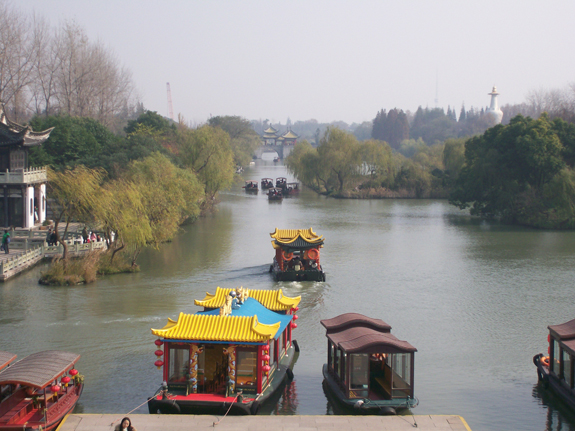
Our hosts led us towards them and we stood in a line facing this unexpected crowd. Beautiful slender girls in purple costumes gave us sprigs of lily grass and scented red silk pouches to hold. Then a round table materialised decked with familiar glasses and I knew that a toast was imminent with the white liquor baijiu, which, thankfully, must be downed in one gulp. Perhaps the baijiu arrived after the readings – it’s all a blur now – though I do remember that I had to read my attempt first, relieved that none of our hosts would understand it. Here it is:
Poem for the Red Bridge Autumn Ceremony
The willow leaves trail to where lily grass yellows,
the fang of flying geese and arched bridge paint echoes.
Here in this crucible where the sun’s molten gold flames
we should call our own haven Slender Western Lake.
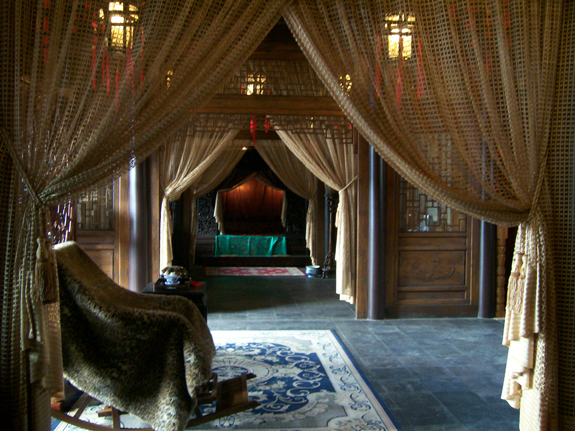
Later that day, George read his haunting sonnet ‘Water’, which includes the magical line “That it shall arch its back in the sun”. I read my poem ‘What the Water Gave Me (VI)’, so there was a distinct watery theme to our visit. From our dragon-boat I spied waterfalls and wished we could stop to see them up close, though I suspected they were man-made.
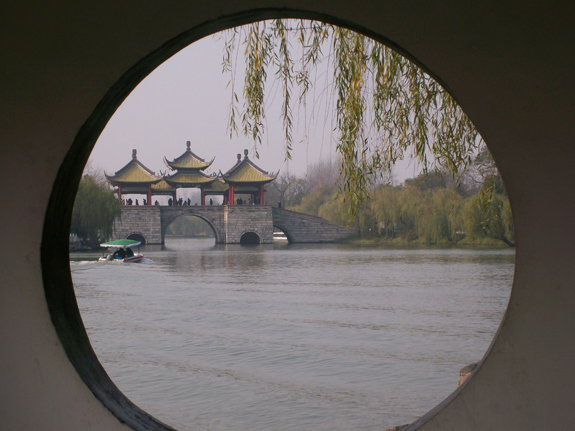
Last time I was in China, in 2007, I flew from Shanghai to Beijing and from Beijing to Chengdu, and saw just how shan-shui China is, with the almost continuous vistas of mountains, lakes and rivers that unfolded beneath my window. Yet the two mountains I climbed then – Huangshan (in Anhui Province) and Qingcheng (in Sichuan Province) – were both extremely wild and extremely tamed, with steps carved into every slope and sheer wall. On the summits of Huangshan there were otherworldly cloud-and mist-seas floating between the striated rock cliffs; there were also hordes of people squeezed onto the narrow paths of each jagged peak.
Lian’s poems have this extreme wildness. But, in ‘Questions about the Demon Taotie’, the wildness is harnessed in the form of the vessel, however dark the contents and his country’s past; the form tames the horror. I don’t speak Mandarin, so the only way I could translate such a kaleidoscope of disturbing images, and the mosaic of ideas implicit in the pictorial characters, was to spend hours grilling him about each nuance of sound and meaning. Afterwards, I had to spend time alone fine-tuning the poem, so that the result hopefully reads as a poem in English, not just as a ‘translation’, and this required quiet time getting each line idiomatically natural, and to hone the sonic qualities. The result is inevitably a failure, but the attempt is worthwhile.
My own poems were translated before my arrival, so the whole translating time was dedicated to translating from Chinese; there is little known about contemporary Chinese poetry in the UK, so I was happy to do that. My translations of Lian’s and Kaiyu’s poems will soon appear in Poetry Review and New Welsh Review.
The cauldron in the Shanghai Museum vault haunted me throughout the whole trip, not just because Lian kept joking that we were taotie every time we sat down to yet another banquet (taotie can also mean ‘glutton’), while a cornucopia of culinary delights passed by on the revolving lazy Susan, but because the cauldron of Chinese culture appears to be inexhaustible. I don’t think I understand the politics any more than I did before, but my impressions of the culture are richer and deeper for this visit.


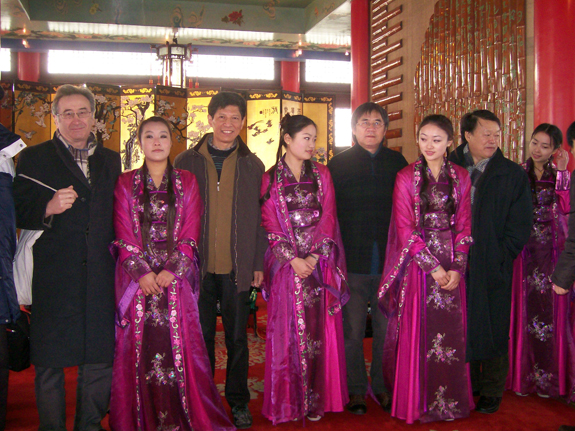
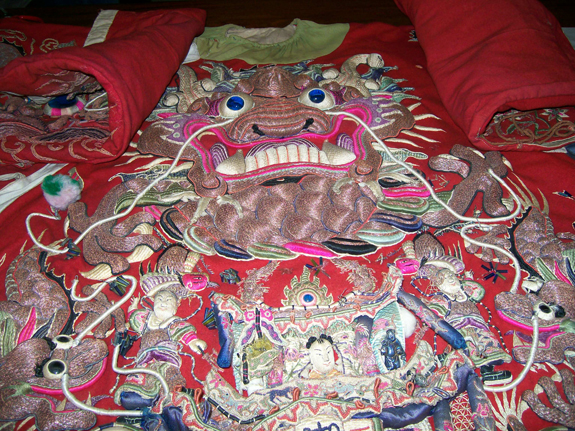
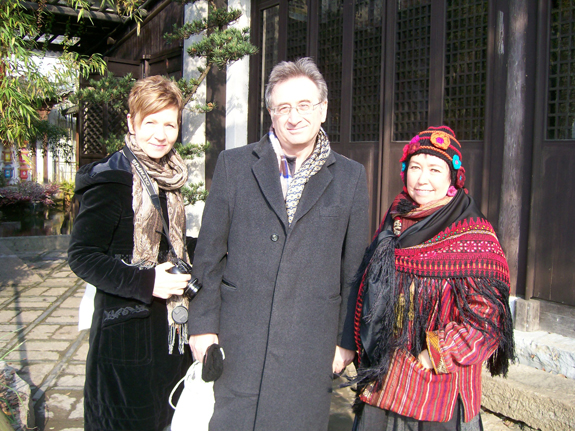

This is so beautiful, Pascale. Thank you for the experience you shared, and I reveled in your verses that explored such delicacies with precision and care. I wondered if you did not wear any Chinese brocades…!